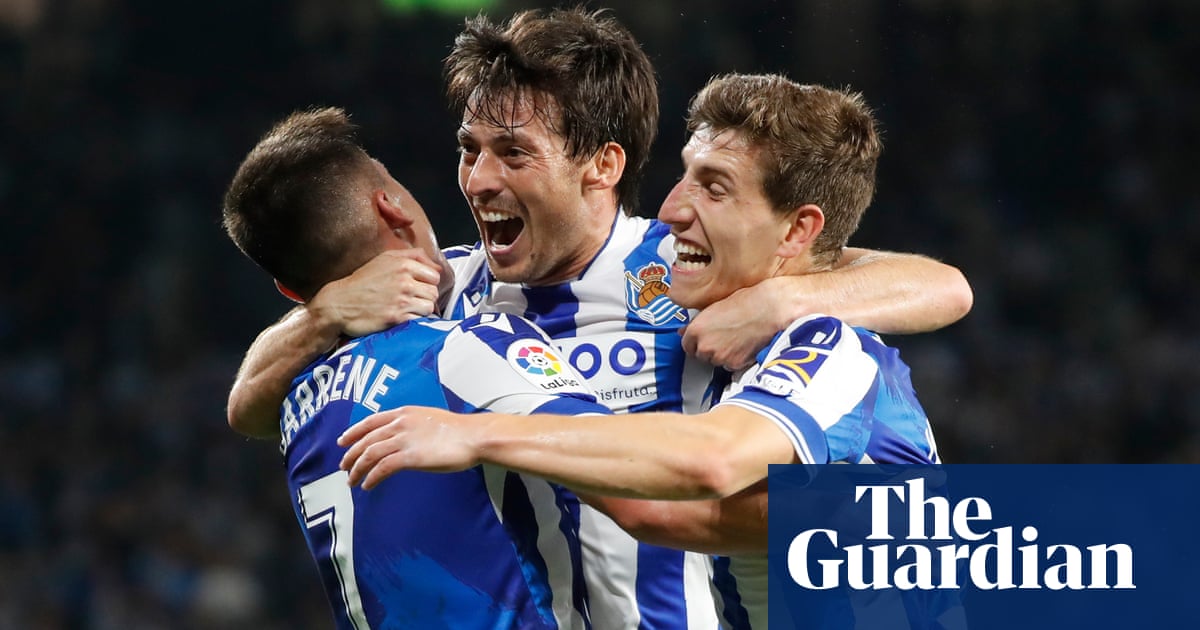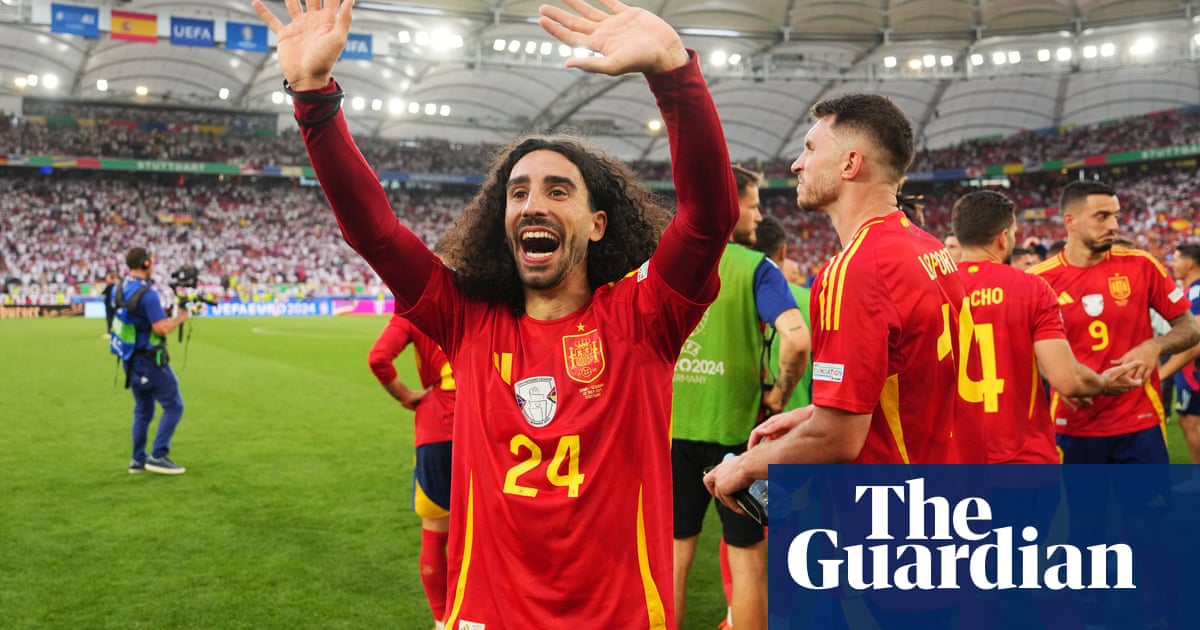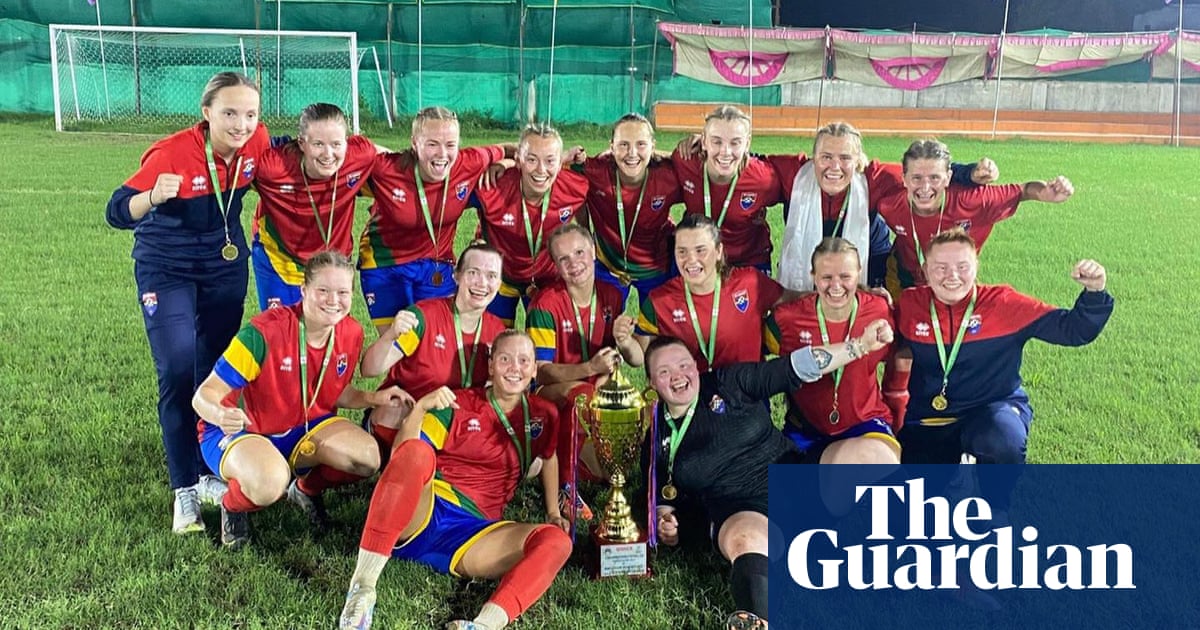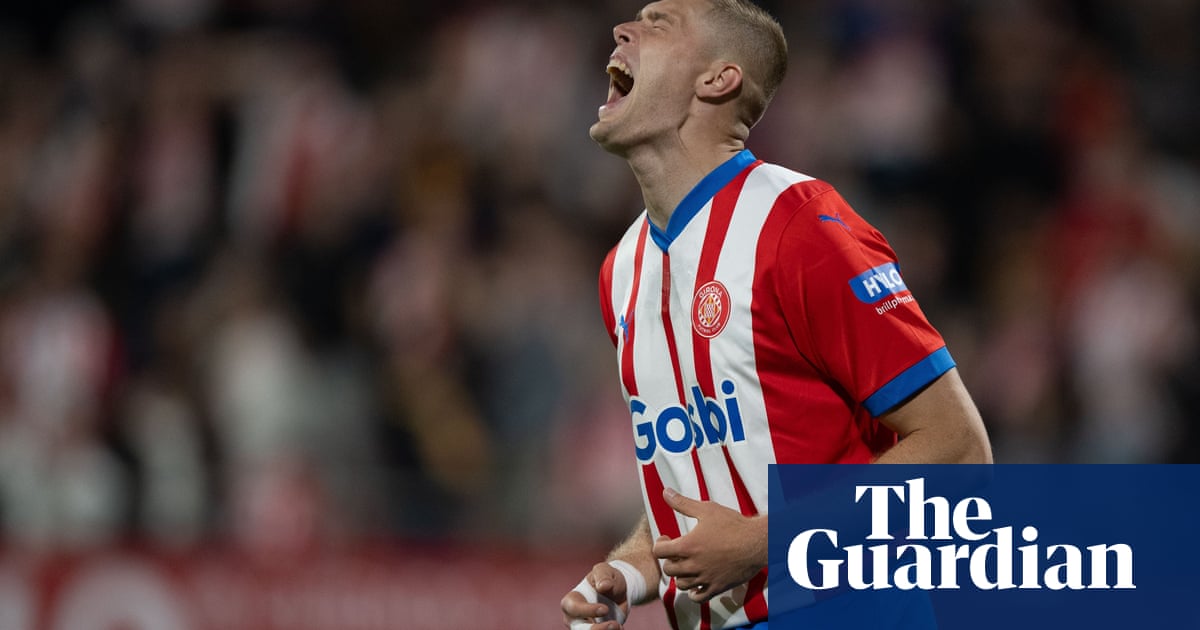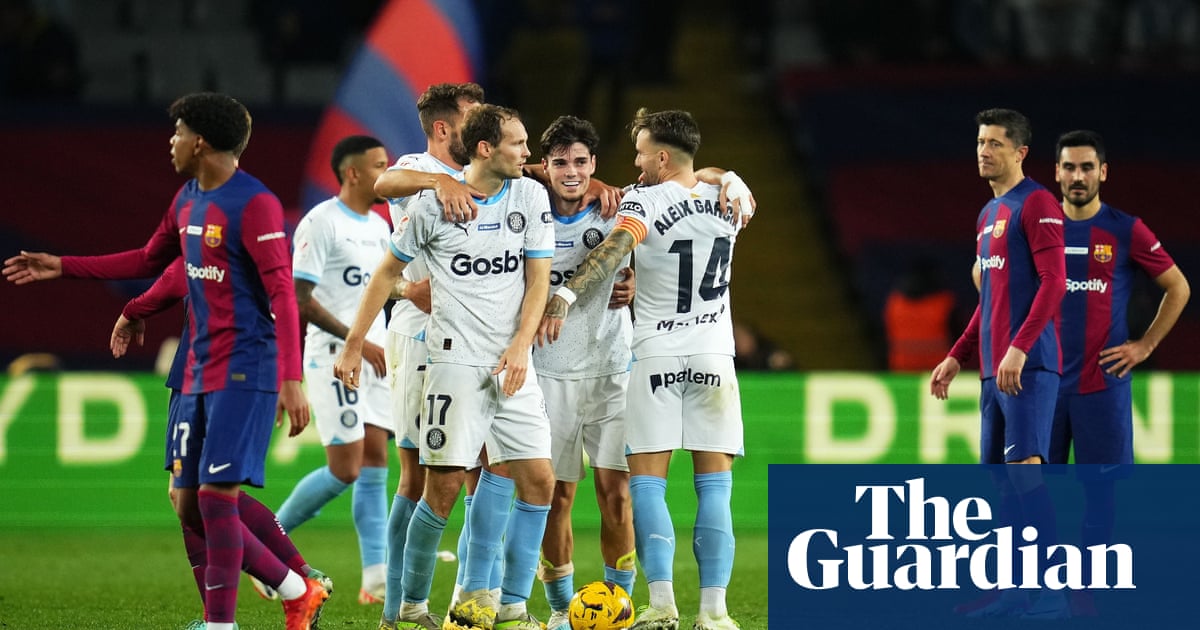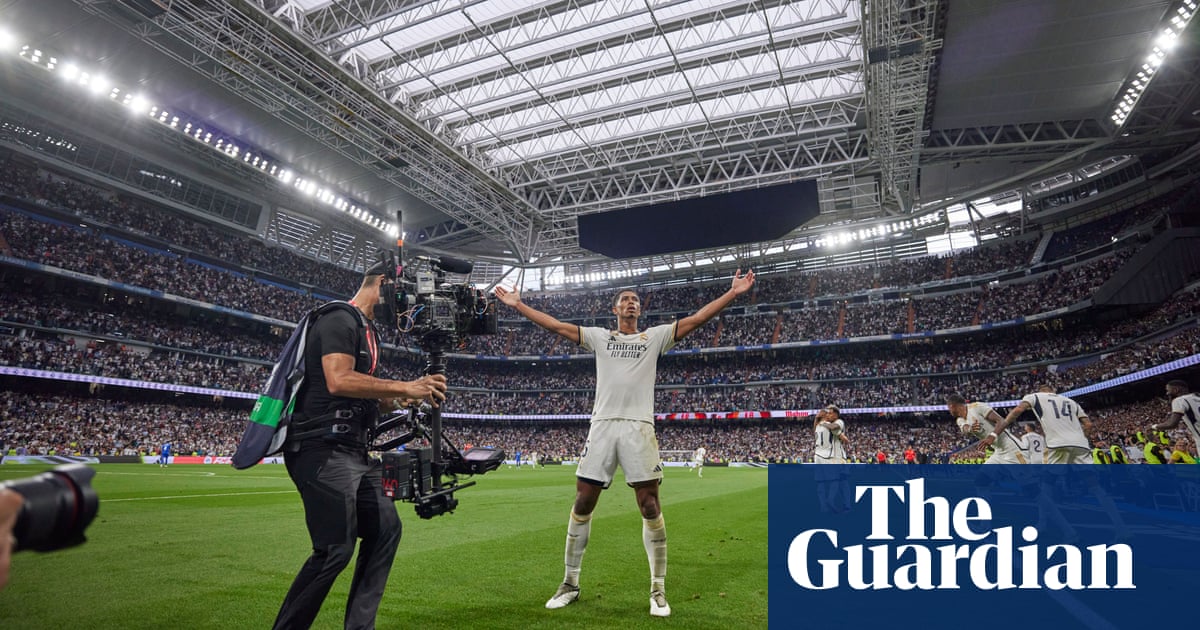
Rodri Hernández grabs a chair from a portable building beside training pitch 3 at Qatar University and places it in the shadow outside, escaping the midday sun to talk. It’s the eve of Spain’s World Cup debut and he has been chatting for a while, getting on to the tournament favourites and going through the usual suspects – “Brazil, France, maybe England” – when he says it. Spain are the best team here.
It’s a big statement but it’s not delivered that way. There’s no bravado and the key word is team. Instead, there is an analysis that says much about the approach of the selección, an idea that remains; one Rodri recognises as his own, going back to the beginning. Which is why when he is asked whether theory is one thing, reality another, if it’s hard to actually put the philosophy in place, he replies: “Not in our case, no, because it’s been many years. Almost all of us have been through the national team at many levels; we’ve won something at youth level.”
Rodri was a European champion at under-19 level, runner-up as an under-21. Twelve members of the Spain squad have won titles at under-19 or under-21 level. In the case of seven of those who haven’t, it is largely because they did not get time: Nico Williams, Yéremi Pino and Ansu Fati, who are 20, Alejandro Balde and Pedri, both 19, and Gavi, still only 18, reached the first team too fast to have a shot at non‑senior success. Sergio Busquets, at 34 the oldest player in the squad, got his call-up in 2009, aged 20. He had won a World Cup within a year of playing in the fourth tier.
Only the two back-up goalkeepers, both of whom began their professional club careers in England, and the central defender Aymeric Laporte, who represented France at junior level, have not played for Spain before senior level. This is the final phase of a long process. And that, Rodri says, is why it works.
It is why Gavi and Pedri can make the transition so smoothly, so young – “premature”, in Rodri’s words. “There has clearly been a ‘recycling’. The manager has no fear putting them in and it’s paying off. They also have a big margin for improvement – they’re going to be very important for the national team. They’re showing from very young that they have the ability to compete. If you see early what teammates are doing, if you understand the concepts, when you come in, it’s automatic: understand the idea and it appears naturally.”
Mamado is the word Rodri uses: literally, it means to have suckled, breastfed; in this case, on an idea. “All of us have come through with coaches who have a similar profile, the same idea. We have mamado, been raised on that. So simply, when we get to the [senior] national team, the coach applies his vision but within a context where we have been doing that for many years. For us it’s innate, it happens on its own. Other countries have other things: maybe England are good at duels, long balls. Spain has those concepts.
“When you look at it from the point of view of the players, [there’s] France, England: the market value they have is incredible but honestly at a collective level I think we’re the best national team, and that’s our trump card.
“In football, there’s no point in playing well and losing but when you see the mechanism in our team, the structure, when you see how every player is involved defensively and offensively, the way we understand the game, what the manager wants and how that idea is taken on to the pitch, then in my opinion we’re the best national team. I’m not saying that in terms of the individual players but I think the collective is the most important thing – that was always the case – and that’s what Spain has.”
It’s what Manchester City have too, which helps. “Pep and Luis Enrique propose the same thing: they have a very, very similar style with personality, wanting to take the initiative, pressing high,” Rodri says. “There are small details that are different but it is much easier to adapt for me. It depends too on the players around you. If you have [Erling] Haaland in your team, you’re maybe going to get the ball into the box more than if you don’t have a striker who is so strong, if your players have other qualities, when you play to feet.”
Few understand or explain the mechanics better than Rodri. The problem at times has been that one man who perhaps embodies the style even more plays in his position, the pivot upon which it all hinges. Busquets – captain, the last man standing from 2010 – will play his 140th Spain game on Wednesday, against Costa Rica. “The manager always says it’s a dilemma, really hard, and I understand that,” Rodri says. “But I’m happy because ‘Busi’ demands more of me.”
Couldn’t he have both? How would you adapt? “From a defensive point of view, I prefer to play with a double-pivot because you have more defensive support, you cover less ground,” Rodri says. “But if with the ball, having a double-pivot means there are a fewer passing lines in front of you, so maybe it’s 50-50. So far the manager has never used two deep midfielders; when we have played together it has been with me playing further ahead, as an inside midfielder.”
There is another option emerging. Luis Enrique has tried Rodri at centre-back, and there are increasing signs it is an option the manager likes. It is one Rodri is open to as well. “I’ve played there six or seven times for City – it’s a position I can play quite well. It’s quite similar to a pivot although you have to know where the last man is. It’s not an unknown for me. In principle, I’m a pivot but in training we are alternating – although the manager likes to do that anyway with lots of positions.”
Amid all that talk of a false 9, a new concept could be emerging: the false 4. Rodri laughs. “If you look, Fernandinho played almost an entire season at centre-back. Fabinho played there when there were injuries, and they’re midfielders. I think it’s the easiest, most logical of the conversions.” Then there was Javier Mascherano, who made the point that if you play for a team that press high, the centre-back occupies the same space a defensive midfielder usually would.
“Totally agree,” Rodri says. “If you attack a deep defence, the majority of the contact you are going to have with the ball as a centre-back is in the pivot’s zone. With the ball, it doesn’t change. Without the ball, though, it’s different. There are other elements: you can’t go up whenever you want, you have to hold, understand the phases of defensive ‘folding in’, when you fall into place.
“It’s not a position where you necessarily have to be very, very strong: if you read the game well you can get there on time. But for me the most important element for a centre‑back is contundencia [being firm and decisive in every action]. That’s the thing a centre-back most needs. If you can add other things, then great. But that’s the key. And if I play there that’s what I have to work on.”
He won’t be doing it alone, that’s for sure; that much is clear when Rodri turns the conversation towards the way the squad are all killing time, awaiting the debut.
“I don’t think I have ever seen a coach become a streamer before: it’s brave, just like him,” Rodri says of Luis Enrique. “It’s fun, he’s getting lots of followers. Personally, I think he has a great sense of humour. Even in the team talks sometimes it’s impossible not to laugh; he’s always talking, a joker, an extrovert, very funny. He creates a great atmosphere but he knows how to differentiate that from the work. When he has to grab you and push you, really squeeze you, he does – I know that very well.”
Rodri laughs. You’re one of those with the coach on your back the most? “Oh, yeah,” he says. “When he has something to say, he says it. And that’s good.”
The message is clear. “We have three teams from three continents and the three are very different. Costa Rica, Germany, Japan: different football cultures, different styles, different physical conditions. It’s hard to judge national teams that are not from your continent.
“We’re working on ways to attack Costa Rica now. We haven’t studied Japan as much yet but I know their football culture: the prototype is an agile, technically very good player, and they’ve improved a lot. Just look at the players Germany have. And whoever they have playing they’re always able to reach the final stages anyway. They don’t always need to play especially well, they have that competitive character. They’re one of the favourites.
“There will always be elements, details that change according to who is in front of you and moments in the game and we have worked on that. There are nuances. We have worked on moments when we’re ahead, if it’s a draw, how we adjust, if they close up, if they come to us man to man. But more or less it doesn’t matter who we face, we always want to take the weight of the game from the start, we want the ball, we want to play high, all those things we always do.”





